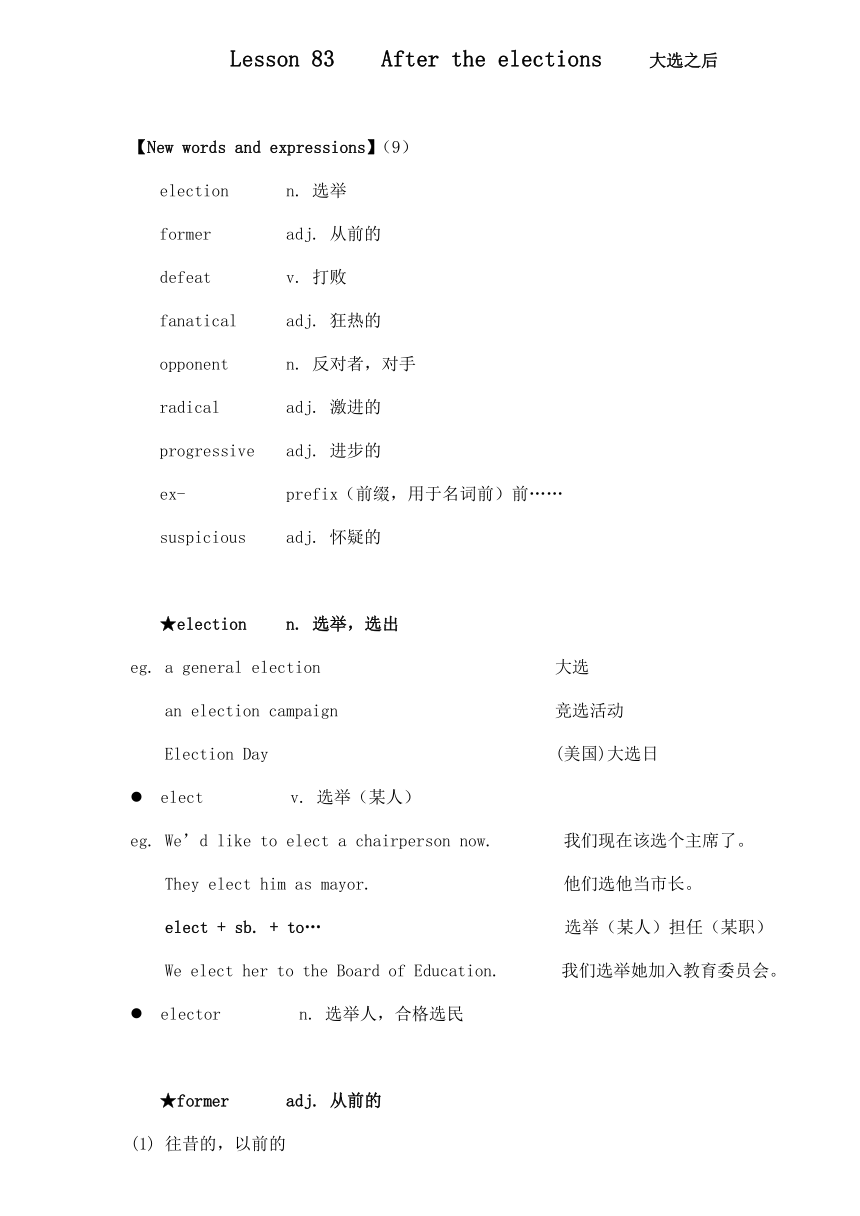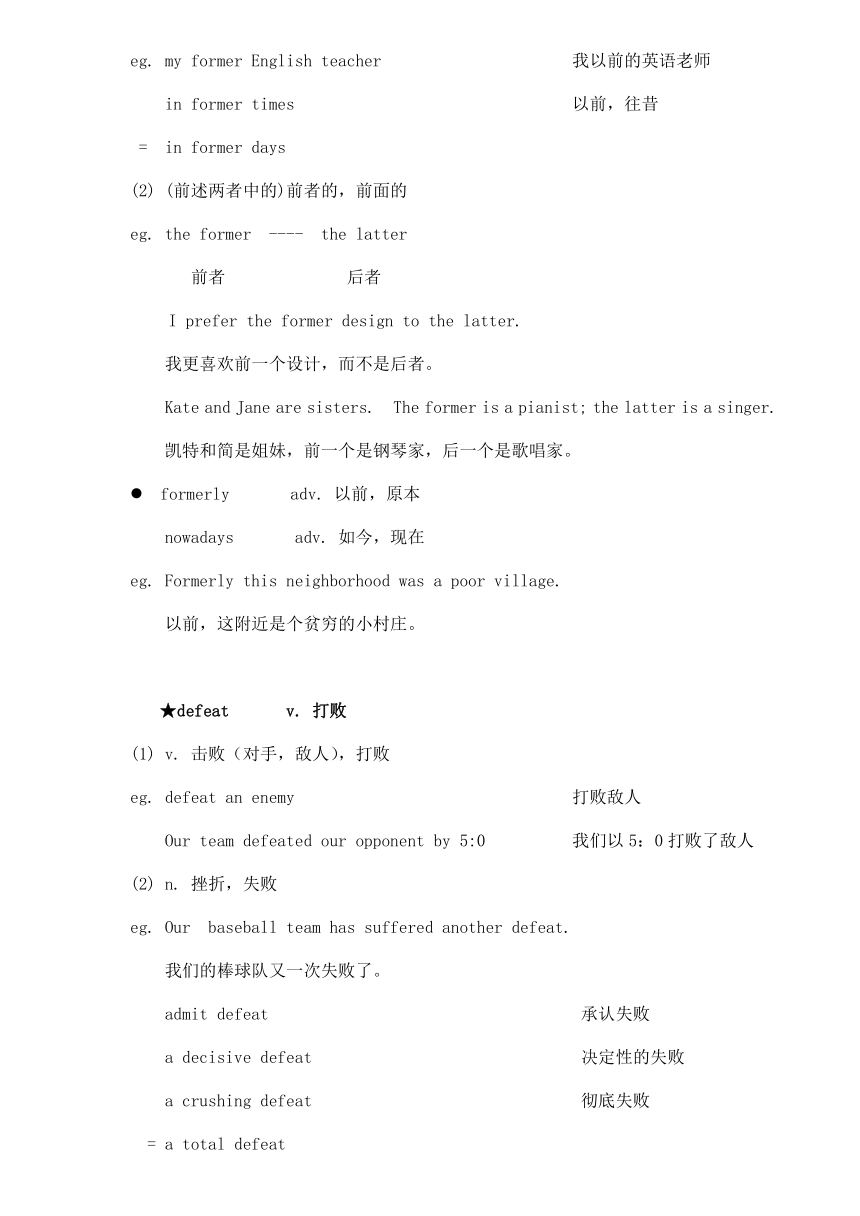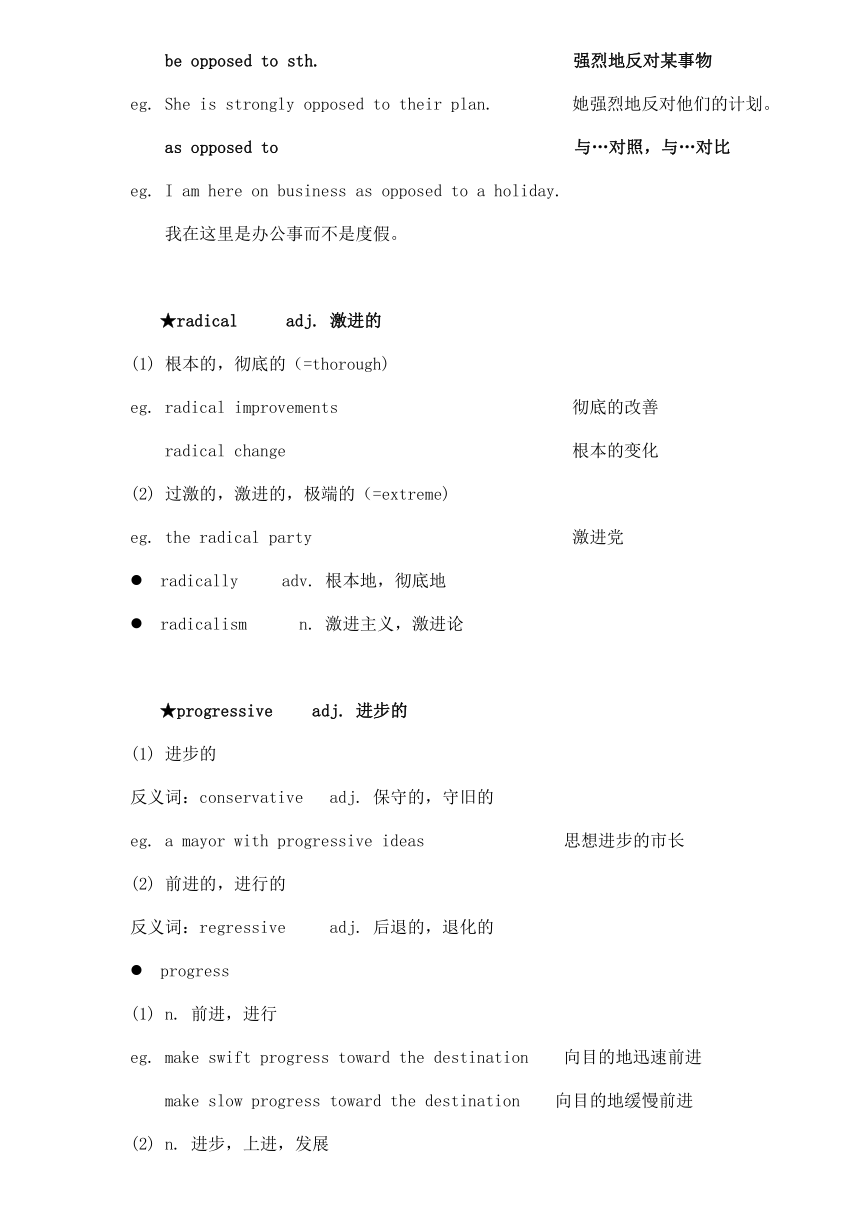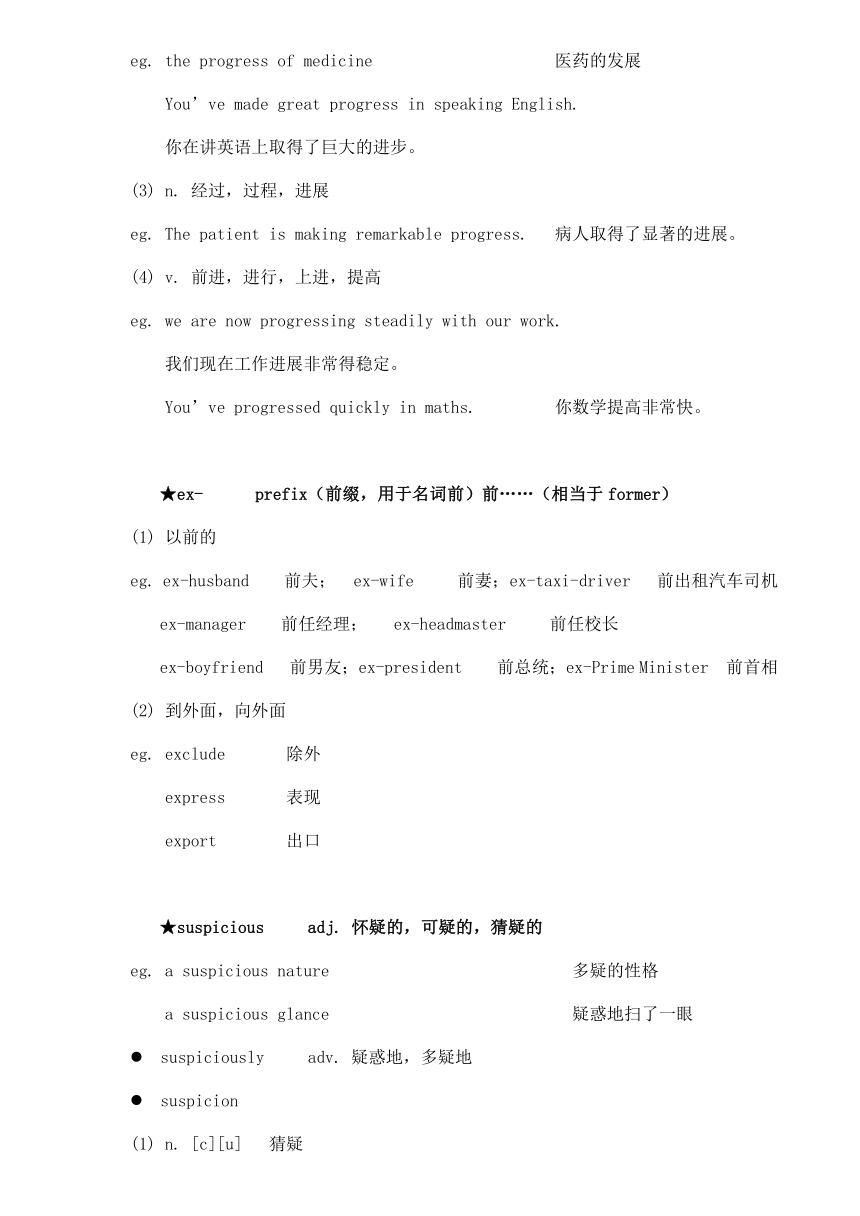新概念英语二册超详教案讲义笔记Lesson 83 After the elections 大选之后
文档属性
| 名称 | 新概念英语二册超详教案讲义笔记Lesson 83 After the elections 大选之后 |  | |
| 格式 | docx | ||
| 文件大小 | 29.5KB | ||
| 资源类型 | 教案 | ||
| 版本资源 | 新概念英语 | ||
| 科目 | 英语 | ||
| 更新时间 | 2023-09-26 09:44:48 | ||
图片预览





文档简介
Lesson 83 After the elections 大选之后
【New words and expressions】(9)
election n. 选举
former adj. 从前的
defeat v. 打败
fanatical adj. 狂热的
opponent n. 反对者,对手
radical adj. 激进的
progressive adj. 进步的
ex- prefix(前缀,用于名词前)前……
suspicious adj. 怀疑的
★election n. 选举,选出
eg. a general election 大选
an election campaign 竞选活动
Election Day (美国)大选日
elect v. 选举(某人)
eg. We’d like to elect a chairperson now. 我们现在该选个主席了。
They elect him as mayor. 他们选他当市长。
elect + sb. + to… 选举(某人)担任(某职)
We elect her to the Board of Education. 我们选举她加入教育委员会。
elector n. 选举人,合格选民
★former adj. 从前的
往昔的,以前的
eg. my former English teacher 我以前的英语老师
in former times 以前,往昔
= in former days
(前述两者中的)前者的,前面的
eg. the former ---- the latter
前者 后者
I prefer the former design to the latter.
我更喜欢前一个设计,而不是后者。
Kate and Jane are sisters. The former is a pianist; the latter is a singer.
凯特和简是姐妹,前一个是钢琴家,后一个是歌唱家。
formerly adv. 以前,原本
nowadays adv. 如今,现在
eg. Formerly this neighborhood was a poor village.
以前,这附近是个贫穷的小村庄。
★defeat v. 打败
v. 击败(对手,敌人),打败
eg. defeat an enemy 打败敌人
Our team defeated our opponent by 5:0 我们以5:0打败了敌人
n. 挫折,失败
eg. Our baseball team has suffered another defeat.
我们的棒球队又一次失败了。
admit defeat 承认失败
a decisive defeat 决定性的失败
a crushing defeat 彻底失败
= a total defeat
= an utter defeat
★fanatical adj. 狂热的
fanatic
adj. 狂热的,入迷的
n. (主义,宗教等的)狂信者
fan n. (口)迷,热心爱好者
eg. a baseball fan 棒球迷
be crazy about sth. 对某事物狂热
= be mad about sth.
fan letter 仰慕者的来信
★opponent n. 反对者,对手(比赛、讨论等的)
eg. He beat his opponent by three sets to one.
他以三比一击败对手。
oppose v.
反对,抵抗
eg. I oppose your going there alone. 我反对你一个人去那儿。
The storm opposed our advance. 暴雨阻止我们前进。
使对立,使对抗
oppose + sth. + to
= oppose + sth. + against
eg. He considered the matter, opposing its merits against its demerits.
= He considered the matter, opposing its merits to its demerits.
他对比了优缺点来考虑这件事情。
opposed adj.
be opposed to sth. 强烈地反对某事物
eg. She is strongly opposed to their plan. 她强烈地反对他们的计划。
as opposed to 与…对照,与…对比
eg. I am here on business as opposed to a holiday.
我在这里是办公事而不是度假。
★radical adj. 激进的
根本的,彻底的(=thorough)
eg. radical improvements 彻底的改善
radical change 根本的变化
(2) 过激的,激进的,极端的(=extreme)
eg. the radical party 激进党
radically adv. 根本地,彻底地
radicalism n. 激进主义,激进论
★progressive adj. 进步的
进步的
反义词:conservative adj. 保守的,守旧的
eg. a mayor with progressive ideas 思想进步的市长
前进的,进行的
反义词:regressive adj. 后退的,退化的
progress
n. 前进,进行
eg. make swift progress toward the destination 向目的地迅速前进
make slow progress toward the destination 向目的地缓慢前进
n. 进步,上进,发展
eg. the progress of medicine 医药的发展
You’ve made great progress in speaking English.
你在讲英语上取得了巨大的进步。
n. 经过,过程,进展
eg. The patient is making remarkable progress. 病人取得了显著的进展。
v. 前进,进行,上进,提高
eg. we are now progressing steadily with our work.
我们现在工作进展非常得稳定。
You’ve progressed quickly in maths. 你数学提高非常快。
★ex- prefix(前缀,用于名词前)前……(相当于former)
(1) 以前的
eg. ex-husband 前夫; ex-wife 前妻;ex-taxi-driver 前出租汽车司机
ex-manager 前任经理; ex-headmaster 前任校长
ex-boyfriend 前男友;ex-president 前总统;ex-Prime Minister 前首相
到外面,向外面
eg. exclude 除外
express 表现
export 出口
★suspicious adj. 怀疑的,可疑的,猜疑的
eg. a suspicious nature 多疑的性格
a suspicious glance 疑惑地扫了一眼
suspiciously adv. 疑惑地,多疑地
suspicion
n. [c][u] 猜疑
eg. with suspicion 怀疑地
His remarks aroused my suspicion. 他的话引起了我的猜疑。
I have a suspicion that my phone has been tapped.
我怀疑我的电话被窃听了。
一些,一点点
eg. I smelled a suspicion of fragrance when she passed.
当她经过的时候,我闻到一点点香气。
suspect
v. 猜疑
eg. suspect sb of… 猜疑某人某事
She suspected him of taking her money. 她猜疑他拿了她的钱。
(口)猜想,以为
… suspect that
eg. She suspected he was lying. 她认为他在说谎。
suspect sb. to be
I suspect him to be the pickpocket. 我认为他是个扒手。
【Text】
The former Prime Minister, Mr. Wentworth Lane, was defeated in the recent elections. He is now retiring from political life and has gone abroad. My friend, Patrick, has always been a fanatical opponent of Mr. Lane's Radical Progressive Party. After the elections, Patrick went to the former Prime Minister's house. When he asked if Mr. Lane lived there, the policeman on duty told him that since his defeat, the ex-Prime Minister had gone abroad. On the following day, Patrick went to the house again. The same policeman was just walking slowly past the entrance, when Patrick asked the same question. Though a little suspicious this time, the policeman gave him the same answer. The day after, Patrick went to the house once more and asked exactly the same question. This time, the policeman lost his temper. 'I told you yesterday and the day before yesterday,' he shouted, 'Mr. Lane was defeated in the elections. He has retired from political life and gone to live abroad!"
'I know,' answered Patrick, 'but I love to hear you say it!'
参考译文
前首相温特沃兹.莱恩先生在最近的大选中被击败。他现在退出了政界,到国外去了。我的朋友帕特里克一直是莱恩先生的激进党的强烈反对者。大选结束后,帕特里克来到了前首相的住处。当他询问莱恩先生是否住在那里时,值班的警察告诉他这位前首相落选后出国去了。第二天,帕特里克再次来到首相的住处。昨天的那位警察正从门口慢慢走过,帕特里克上前问了和昨天同样的问题。虽然那位警察这次有点疑心,但还是对他作了同样的回答。第三天,帕特里克又去了,提出了同前两天完全一样的问题。这一次警察火了。“我昨天和前天都告诉过您了,”他大叫着,“莱恩先生在大选中被击败了,他已经退出了政界去国外了!”
“这我都知道,”帕特里克说,“可我就是喜欢听你说出这此!”
【课文讲解】
1、After the elections
the elections 大选(英文中election常用复数形式,后接表示复数的动词,用来指全国性的选举;一般的选举用单数)
eg. He hopes to defeat his rival in next year’s elections.
2、The former Prime Minister, Mr. Wentworth Lane, was defeated in the recent elections.
former adj. 以前的,从前的,前任的(后跟名词)
the former Prime Minister 前首相
= the ex-Prime Minister
was defeated 被击败
defeat sb. = beat sb. 击败某人,打败某人
win a prize/game 赢了奖品/比赛
He is now retiring from political life and has gone abroad.
retiring from political life 退出政界
retire v. 退休
eg. My father will retire at the age of 60. 我的父亲会在60岁退休。
retire to 隐退,后退,离去
eg. He retired to his own room after supper.
吃完晚饭,他回到自己的房间。
go abroad 出国
travel abroad 出国留学
study abroad 出国留学
live abroad 在国外居住
be abroad 在国外
from abroad 从海外来的
eg. He has just returned from abroad. 他刚刚回国。
My friend, Patrick, has always been a fanatical opponent of Mr. Lane's Radical Progressive Party.
Radical Progressive Party 激进党
After the elections, Patrick went to the former Prime Minister's house.
the elections 大选
When he asked if Mr. Lane lived there, the policeman on duty told him that since his defeat, the ex-Prime Minister had gone abroad.
when he asked if Mr. Lane lived there中if 引导一句话作ask的宾语从句
the policeman on duty told him that since his defeat中that从句作told的宾语从句
duty
n. 责任,义务,本分
eg. on duty 值班,在岗
off duty 不值班,不在岗
do one’s duty 尽本分
neglect one’s duty 忽视某人的责任
n. 税,关税
eg. customs duty 海关税
export duties 出口税
import duties 进口税
On the following day, Patrick went to the house again. The same policeman was just walking slowly past the entrance, when Patrick asked the same question.
walk past prep. 走过,经过
entrance
入口,大门口
eg. entrance to the park 公园入口
the front entrance of a school 学校的正门
the back entrance 后门
进入,入场,演员的登场
eg. The actor made several entrances. 那位演员已数次登台。
entrance into college 进入大学
= entrance into college
gain entrance to university 获得上大学的许可
entrance examination 入学考试
entrance upon office 就职,任职
= entrance into office
8、Though a little suspicious this time, the policeman gave him the same answer.
though引导的是一个让步状语从句,其中的主语和谓语都省略了,完整的从句是:
Though the policeman was a little suspicious this time…
(如果从句的主语和主句的相同而谓语带系动词be,则主语+be可省略;但原因状语从句的省略形式要带分词being:)
If possible, please let me know by this evening.
如果可能的话,请今晚以前告诉我。
Being worried about his child, he walked up and down in the room.
9、The day after, Patrick went to the house once more and asked exactly
the same question. This time, the policeman lost his temper.
lose one’s temper 发脾气
= fly into a temper = get into a temper
temper
n. 脾气
eg. Keep your temper! = Don’t get angry! 不要发脾气。
n. 心情,情绪
eg. After what happened last night, I was surprised to find that he was in such
a good temper this morning.
在昨晚发生事情之后,我惊奇地发现他今天情绪很好。
mood n. 心情,情绪
eg. I enjoyed myself at the party. I was in a very good mood.
我在聚会上玩得很开心,心情非常好。(= I was cheerful.)
Don’t disturb him. He’s in a very bad mood.
别打扰他,他心情不好。
I’m in the mood for a drive into the country.
= I would very much like to go for a drive into the country.
我很想开车去乡下兜兜风。
be in the mood for sth. 有做某事的心思或兴致
= be in the mood for doing sth.
= be in the mood to do…
10、'I told you yesterday and the day before yesterday,' he shouted, 'Mr. Lane was defeated in the elections. He has retired from political life and gone to live abroad!" 'I know,' answered Patrick, 'but I love to hear you say it!'
【Key Structures】(本课重点:各种时态和被动语态的运用)
现在进行时:be + v-ing
一般现在时
一般过去时
现在完成时:have + p.p./ has + p.p.
过去完成时: had + p.p.
现在完成进行时: has been doing/ have been doing
过去进行时: were + v-ing / was + v-ing
被动语态: be + p.p.
【Letter Writing】
结束语:
I am very sorry for all the trouble this has caused you. I wish you good luck/every success in…
【Special Difficulties】
Temper and Mood
temper
① n. 脾气,性情
This time, the policeman lost his temper.
Whatever happens, remember to keep our temper.
My sister is of a calm/quick temper. 我姐姐/妹妹性情平和/脾气急躁。
The boss is in a temper today. 老板今天脾气不好。
② n. 心情,情绪(与mood同义)
That morning he was in a good mood/temper.
mood n. 心情,情绪;有意/想要(做某事)(不能用temper)
When he is in a bad temper, he gets angry easily. But when he is in a bad mood, he likes to sit alone. (bad mood和bad temper稍有区别)
当他脾气不好时,他很容易生气。但当他心情不好时,他喜欢独自坐着。
At that time I was not in the mood for talking/to talk. (不能用temper)
Although Jeremy is well-known for his great sense of humour, he is in no mood for telling funny stories today. (不能用temper)
【Summary Writing】
After having been defeated in the recent elections, the former Prime Minister, Mr. Wentworth Lane, retired abroad. My friend Patrick, who has always been a fanatical opponent of Mr. Lane’s Radical Progressive Party, went to his house three times and asked the policeman on duty whether it was Mr. Lane’s house. When he asked for the third time, the angry policeman told him again of Mr. Lane’s defeat and retirement. Patrick said that it was something he loved to hear.
Since being defeated in the recent elections, the former Prime Minister, Mr. Wentworth Lane, has retired abroad. As my friend Patrick has always been a fanatical opponent of Mr. Lane’s radical Progressive Party, he went to his house three times. Each time he asked the same policeman if it was Mr. Lane’s house. The third time he was told again by the angry policeman of Mr. Lane’s defeat and retirement, but Patrick said it was something he loved to hear.
【New words and expressions】(9)
election n. 选举
former adj. 从前的
defeat v. 打败
fanatical adj. 狂热的
opponent n. 反对者,对手
radical adj. 激进的
progressive adj. 进步的
ex- prefix(前缀,用于名词前)前……
suspicious adj. 怀疑的
★election n. 选举,选出
eg. a general election 大选
an election campaign 竞选活动
Election Day (美国)大选日
elect v. 选举(某人)
eg. We’d like to elect a chairperson now. 我们现在该选个主席了。
They elect him as mayor. 他们选他当市长。
elect + sb. + to… 选举(某人)担任(某职)
We elect her to the Board of Education. 我们选举她加入教育委员会。
elector n. 选举人,合格选民
★former adj. 从前的
往昔的,以前的
eg. my former English teacher 我以前的英语老师
in former times 以前,往昔
= in former days
(前述两者中的)前者的,前面的
eg. the former ---- the latter
前者 后者
I prefer the former design to the latter.
我更喜欢前一个设计,而不是后者。
Kate and Jane are sisters. The former is a pianist; the latter is a singer.
凯特和简是姐妹,前一个是钢琴家,后一个是歌唱家。
formerly adv. 以前,原本
nowadays adv. 如今,现在
eg. Formerly this neighborhood was a poor village.
以前,这附近是个贫穷的小村庄。
★defeat v. 打败
v. 击败(对手,敌人),打败
eg. defeat an enemy 打败敌人
Our team defeated our opponent by 5:0 我们以5:0打败了敌人
n. 挫折,失败
eg. Our baseball team has suffered another defeat.
我们的棒球队又一次失败了。
admit defeat 承认失败
a decisive defeat 决定性的失败
a crushing defeat 彻底失败
= a total defeat
= an utter defeat
★fanatical adj. 狂热的
fanatic
adj. 狂热的,入迷的
n. (主义,宗教等的)狂信者
fan n. (口)迷,热心爱好者
eg. a baseball fan 棒球迷
be crazy about sth. 对某事物狂热
= be mad about sth.
fan letter 仰慕者的来信
★opponent n. 反对者,对手(比赛、讨论等的)
eg. He beat his opponent by three sets to one.
他以三比一击败对手。
oppose v.
反对,抵抗
eg. I oppose your going there alone. 我反对你一个人去那儿。
The storm opposed our advance. 暴雨阻止我们前进。
使对立,使对抗
oppose + sth. + to
= oppose + sth. + against
eg. He considered the matter, opposing its merits against its demerits.
= He considered the matter, opposing its merits to its demerits.
他对比了优缺点来考虑这件事情。
opposed adj.
be opposed to sth. 强烈地反对某事物
eg. She is strongly opposed to their plan. 她强烈地反对他们的计划。
as opposed to 与…对照,与…对比
eg. I am here on business as opposed to a holiday.
我在这里是办公事而不是度假。
★radical adj. 激进的
根本的,彻底的(=thorough)
eg. radical improvements 彻底的改善
radical change 根本的变化
(2) 过激的,激进的,极端的(=extreme)
eg. the radical party 激进党
radically adv. 根本地,彻底地
radicalism n. 激进主义,激进论
★progressive adj. 进步的
进步的
反义词:conservative adj. 保守的,守旧的
eg. a mayor with progressive ideas 思想进步的市长
前进的,进行的
反义词:regressive adj. 后退的,退化的
progress
n. 前进,进行
eg. make swift progress toward the destination 向目的地迅速前进
make slow progress toward the destination 向目的地缓慢前进
n. 进步,上进,发展
eg. the progress of medicine 医药的发展
You’ve made great progress in speaking English.
你在讲英语上取得了巨大的进步。
n. 经过,过程,进展
eg. The patient is making remarkable progress. 病人取得了显著的进展。
v. 前进,进行,上进,提高
eg. we are now progressing steadily with our work.
我们现在工作进展非常得稳定。
You’ve progressed quickly in maths. 你数学提高非常快。
★ex- prefix(前缀,用于名词前)前……(相当于former)
(1) 以前的
eg. ex-husband 前夫; ex-wife 前妻;ex-taxi-driver 前出租汽车司机
ex-manager 前任经理; ex-headmaster 前任校长
ex-boyfriend 前男友;ex-president 前总统;ex-Prime Minister 前首相
到外面,向外面
eg. exclude 除外
express 表现
export 出口
★suspicious adj. 怀疑的,可疑的,猜疑的
eg. a suspicious nature 多疑的性格
a suspicious glance 疑惑地扫了一眼
suspiciously adv. 疑惑地,多疑地
suspicion
n. [c][u] 猜疑
eg. with suspicion 怀疑地
His remarks aroused my suspicion. 他的话引起了我的猜疑。
I have a suspicion that my phone has been tapped.
我怀疑我的电话被窃听了。
一些,一点点
eg. I smelled a suspicion of fragrance when she passed.
当她经过的时候,我闻到一点点香气。
suspect
v. 猜疑
eg. suspect sb of… 猜疑某人某事
She suspected him of taking her money. 她猜疑他拿了她的钱。
(口)猜想,以为
… suspect that
eg. She suspected he was lying. 她认为他在说谎。
suspect sb. to be
I suspect him to be the pickpocket. 我认为他是个扒手。
【Text】
The former Prime Minister, Mr. Wentworth Lane, was defeated in the recent elections. He is now retiring from political life and has gone abroad. My friend, Patrick, has always been a fanatical opponent of Mr. Lane's Radical Progressive Party. After the elections, Patrick went to the former Prime Minister's house. When he asked if Mr. Lane lived there, the policeman on duty told him that since his defeat, the ex-Prime Minister had gone abroad. On the following day, Patrick went to the house again. The same policeman was just walking slowly past the entrance, when Patrick asked the same question. Though a little suspicious this time, the policeman gave him the same answer. The day after, Patrick went to the house once more and asked exactly the same question. This time, the policeman lost his temper. 'I told you yesterday and the day before yesterday,' he shouted, 'Mr. Lane was defeated in the elections. He has retired from political life and gone to live abroad!"
'I know,' answered Patrick, 'but I love to hear you say it!'
参考译文
前首相温特沃兹.莱恩先生在最近的大选中被击败。他现在退出了政界,到国外去了。我的朋友帕特里克一直是莱恩先生的激进党的强烈反对者。大选结束后,帕特里克来到了前首相的住处。当他询问莱恩先生是否住在那里时,值班的警察告诉他这位前首相落选后出国去了。第二天,帕特里克再次来到首相的住处。昨天的那位警察正从门口慢慢走过,帕特里克上前问了和昨天同样的问题。虽然那位警察这次有点疑心,但还是对他作了同样的回答。第三天,帕特里克又去了,提出了同前两天完全一样的问题。这一次警察火了。“我昨天和前天都告诉过您了,”他大叫着,“莱恩先生在大选中被击败了,他已经退出了政界去国外了!”
“这我都知道,”帕特里克说,“可我就是喜欢听你说出这此!”
【课文讲解】
1、After the elections
the elections 大选(英文中election常用复数形式,后接表示复数的动词,用来指全国性的选举;一般的选举用单数)
eg. He hopes to defeat his rival in next year’s elections.
2、The former Prime Minister, Mr. Wentworth Lane, was defeated in the recent elections.
former adj. 以前的,从前的,前任的(后跟名词)
the former Prime Minister 前首相
= the ex-Prime Minister
was defeated 被击败
defeat sb. = beat sb. 击败某人,打败某人
win a prize/game 赢了奖品/比赛
He is now retiring from political life and has gone abroad.
retiring from political life 退出政界
retire v. 退休
eg. My father will retire at the age of 60. 我的父亲会在60岁退休。
retire to 隐退,后退,离去
eg. He retired to his own room after supper.
吃完晚饭,他回到自己的房间。
go abroad 出国
travel abroad 出国留学
study abroad 出国留学
live abroad 在国外居住
be abroad 在国外
from abroad 从海外来的
eg. He has just returned from abroad. 他刚刚回国。
My friend, Patrick, has always been a fanatical opponent of Mr. Lane's Radical Progressive Party.
Radical Progressive Party 激进党
After the elections, Patrick went to the former Prime Minister's house.
the elections 大选
When he asked if Mr. Lane lived there, the policeman on duty told him that since his defeat, the ex-Prime Minister had gone abroad.
when he asked if Mr. Lane lived there中if 引导一句话作ask的宾语从句
the policeman on duty told him that since his defeat中that从句作told的宾语从句
duty
n. 责任,义务,本分
eg. on duty 值班,在岗
off duty 不值班,不在岗
do one’s duty 尽本分
neglect one’s duty 忽视某人的责任
n. 税,关税
eg. customs duty 海关税
export duties 出口税
import duties 进口税
On the following day, Patrick went to the house again. The same policeman was just walking slowly past the entrance, when Patrick asked the same question.
walk past prep. 走过,经过
entrance
入口,大门口
eg. entrance to the park 公园入口
the front entrance of a school 学校的正门
the back entrance 后门
进入,入场,演员的登场
eg. The actor made several entrances. 那位演员已数次登台。
entrance into college 进入大学
= entrance into college
gain entrance to university 获得上大学的许可
entrance examination 入学考试
entrance upon office 就职,任职
= entrance into office
8、Though a little suspicious this time, the policeman gave him the same answer.
though引导的是一个让步状语从句,其中的主语和谓语都省略了,完整的从句是:
Though the policeman was a little suspicious this time…
(如果从句的主语和主句的相同而谓语带系动词be,则主语+be可省略;但原因状语从句的省略形式要带分词being:)
If possible, please let me know by this evening.
如果可能的话,请今晚以前告诉我。
Being worried about his child, he walked up and down in the room.
9、The day after, Patrick went to the house once more and asked exactly
the same question. This time, the policeman lost his temper.
lose one’s temper 发脾气
= fly into a temper = get into a temper
temper
n. 脾气
eg. Keep your temper! = Don’t get angry! 不要发脾气。
n. 心情,情绪
eg. After what happened last night, I was surprised to find that he was in such
a good temper this morning.
在昨晚发生事情之后,我惊奇地发现他今天情绪很好。
mood n. 心情,情绪
eg. I enjoyed myself at the party. I was in a very good mood.
我在聚会上玩得很开心,心情非常好。(= I was cheerful.)
Don’t disturb him. He’s in a very bad mood.
别打扰他,他心情不好。
I’m in the mood for a drive into the country.
= I would very much like to go for a drive into the country.
我很想开车去乡下兜兜风。
be in the mood for sth. 有做某事的心思或兴致
= be in the mood for doing sth.
= be in the mood to do…
10、'I told you yesterday and the day before yesterday,' he shouted, 'Mr. Lane was defeated in the elections. He has retired from political life and gone to live abroad!" 'I know,' answered Patrick, 'but I love to hear you say it!'
【Key Structures】(本课重点:各种时态和被动语态的运用)
现在进行时:be + v-ing
一般现在时
一般过去时
现在完成时:have + p.p./ has + p.p.
过去完成时: had + p.p.
现在完成进行时: has been doing/ have been doing
过去进行时: were + v-ing / was + v-ing
被动语态: be + p.p.
【Letter Writing】
结束语:
I am very sorry for all the trouble this has caused you. I wish you good luck/every success in…
【Special Difficulties】
Temper and Mood
temper
① n. 脾气,性情
This time, the policeman lost his temper.
Whatever happens, remember to keep our temper.
My sister is of a calm/quick temper. 我姐姐/妹妹性情平和/脾气急躁。
The boss is in a temper today. 老板今天脾气不好。
② n. 心情,情绪(与mood同义)
That morning he was in a good mood/temper.
mood n. 心情,情绪;有意/想要(做某事)(不能用temper)
When he is in a bad temper, he gets angry easily. But when he is in a bad mood, he likes to sit alone. (bad mood和bad temper稍有区别)
当他脾气不好时,他很容易生气。但当他心情不好时,他喜欢独自坐着。
At that time I was not in the mood for talking/to talk. (不能用temper)
Although Jeremy is well-known for his great sense of humour, he is in no mood for telling funny stories today. (不能用temper)
【Summary Writing】
After having been defeated in the recent elections, the former Prime Minister, Mr. Wentworth Lane, retired abroad. My friend Patrick, who has always been a fanatical opponent of Mr. Lane’s Radical Progressive Party, went to his house three times and asked the policeman on duty whether it was Mr. Lane’s house. When he asked for the third time, the angry policeman told him again of Mr. Lane’s defeat and retirement. Patrick said that it was something he loved to hear.
Since being defeated in the recent elections, the former Prime Minister, Mr. Wentworth Lane, has retired abroad. As my friend Patrick has always been a fanatical opponent of Mr. Lane’s radical Progressive Party, he went to his house three times. Each time he asked the same policeman if it was Mr. Lane’s house. The third time he was told again by the angry policeman of Mr. Lane’s defeat and retirement, but Patrick said it was something he loved to hear.
同课章节目录
